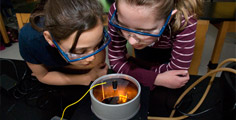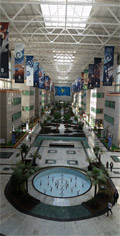Off the plane after a six hour flight to Astana from a windswept and rainy Cambridge. It is bright sunlight and a clear sky and we head off for our first meeting to the Presidential Palace to see Yerbol Orynbaev, educated respectively as a lawyer and economist in Russia and the US, who acts as an Adviser to the President.
Astana was only designated as the capital city in 1997 and most of the buildings, including the Palace, are correspondingly modern. The layout has been carefully planned and you can get a feel for the monumental nature of the cityscape from this virtual tour.
Our next meeting is with the senior team at AEO Nazarbayev Intellectual Schools (NIS) with whom we have been working on a joint project with Cambridge University Press and the University's Education Faculty since 2011. The project has involved setting up twenty schools as 'beacon schools' in which to trial a newly developed curriculum and train teachers in modern pedagogical methods.
 We visited two of the schools – one running an International Baccalaureate programme and one a Cambridge programme – both of which have been built adjacent to the AEO office. They contain the best equipped school laboratories that I have seen anywhere in the world, including the only Cloud Chamber in Asia, which allows you to see radiation particles (photo of a Cloud Chamber in use taken from bnl.gov)
We visited two of the schools – one running an International Baccalaureate programme and one a Cambridge programme – both of which have been built adjacent to the AEO office. They contain the best equipped school laboratories that I have seen anywhere in the world, including the only Cloud Chamber in Asia, which allows you to see radiation particles (photo of a Cloud Chamber in use taken from bnl.gov)
We then go next door to their robotics lab, and the photo shows my hand being shaken in a friendly greeting by one of the robots they had built there, before it went on to run through a quick PE session, including press ups.
 Our next visit is to the University, which was established in 2010. This has again been constructed on a monumental scale, and the picture shows the main atrium.
Our next visit is to the University, which was established in 2010. This has again been constructed on a monumental scale, and the picture shows the main atrium.
It was founded in 2010 and has partnerships with other universities in the UK, US, Germany, South Korea, Japan and Singapore. Admissions are highly competitive and merit based and there is a commitment to using only objective tests so the admissions process can be fully transparent.
This reflects practice within the country as a whole, where university places are allocated on the basis of the UNT , the Uniform National Test, which is a three and a half hour 125 question multiple choice test. Over a million students take it, and it is sat in the morning, with the results declared that afternoon. Though it is widely criticised for being too narrowly based, and dependent on fact-based recall, there are in fact quite high degrees of correlation with success in degree programmes.
Kazakhstan has the declared objective of becoming one of the 50 most competitive countries in the world, and education is central to this. Our involvement in the NIS has allowed us to contribute actively and, having greeted the NIS staff in Cambridge in 2011 when we signed the original contract, it was exciting to see how much has been achieved since then and to be able to observe some of the results on the ground.
Simon Lebus
Chief Executive, Cambridge Assessment